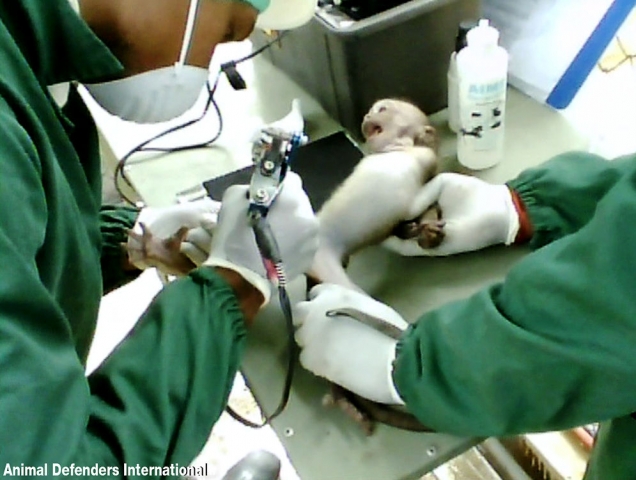
International Primate Day 1st September: Harmful Tests On Our Closest Relatives Must End
For International Primate Day on September 1st 2017, Animal Defenders International (ADI) is calling for action to end the use of primates in research. Worldwide an estimated 200,000 primates are experimented on each year, with over 2,500 animals used in research across the UK, one of the largest users of primates in Europe.
Animal Defenders International President Jan Creamer said: “The continued use of primates in research is unethical and unnecessary. Harmful to both our closest relatives and to science, governments must end primate tests and facilitate the adoption of modern alternatives without delay.”
Some primates are forcibly removed from the wild and used as breeding machines to supply the industry, or used themselves in tests. In addition to the trauma caused to individuals during the capture process, subsequent confinement, and during procedures until their deaths, this brutal practice harms local populations threatening their survival.
In Latin America, ADI has exposed the capture of owl monkeys for use in malaria experiments in Colombia. Taken from the trees, these nocturnal primates go from the forest to a barren cage. Our evidence led to a tribunal revoking the experimenter’s permits; although this groundbreaking decision has been overturned. Elsewhere, in Africa and Asia, ADI has revealed dire conditions inside the monkey breeders, who take primates from the wild to maintain their breeding stocks. At the monkey farms, individuals are confined to cages and routinely manhandled.
Primates are frequently used in brain experiments because of their apparent similarity to humans. However, despite being our closest relatives, non-human primates differ from us in a number of ways, including the immune system. Their use in research therefore can never reliably predict potential human effects. Aspirin for example causes birth defects in monkeys, but is widely used by pregnant women without the same effect.
Such species differences are the fundamental flaw of using animals in research. Each species responds differently to substances, with an animal’s age, diet, sex, even bedding material, also affecting results. As a result animal tests can delay scientific progress and lead to human tragedy.
Just days after being given trial drug BIA 10-2474, the six male volunteers in the highest dose group were hospitalised. Four volunteers displayed neurological symptoms, with at least one losing all his fingers and toes; one of the six volunteers died a week after receiving the dose. No comparable effect had been seen in monkeys or other animals given high doses of the drug over long periods. Some monkeys were estimated to have received around 75 times the dose given to the volunteers.
In another drug trial tragedy, TGN1412 was given to volunteers who then suffered multiple organ failure as the drug triggered an uncontrollable immune response. One volunteer was hospitalised for three months, another had their fingers and toes amputated, and all are likely to suffer permanent damage to their immune systems and live with the danger of developing cancer and lupus. The drug had been tested extensively in laboratory animals including in doses 500 times greater in monkeys with no drug-related adverse events.
Investment in animal research, predominantly with primates, has been wasteful and unsuccessful. A review has shown that not one of the 85+ candidate AIDS vaccines successfully tested in primates have been effective in human patients.
ADI has documented the suffering of primates for product safety tests at the notorious contract testing facility Huntingdon Life Sciences (now known as Envigo). Monkeys were strapped down to restrain them while substances were pumped directly into their stomachs, and they suffered a range of debilitating symptoms.
Researchers claim that the use of primates in brain research is ‘necessary’ but sophisticated neuroimaging techniques are available to study human behaviour and brain function. Comparing data from human electrical brain activity with data obtained by experimenters using electrodes in restrained monkeys, Professor Furlong and his team at Aston University in the UK have shown the same level of data can be obtained, directly relevant to human patients.
More from Animal Defenders International
- Laboratory monkey breeding factory farms still taking animals from the wild
- Wild animal circus ban PASSED in UK Parliament
- New Welsh Government bill will ban wild animal circuses
- Is that fur real? Concerned public invited to check their faux fur items
- First big cats SAVED by UK organisation following Guatemala circus ban

 8 years ago
8 years ago  1945 views
1945 views
